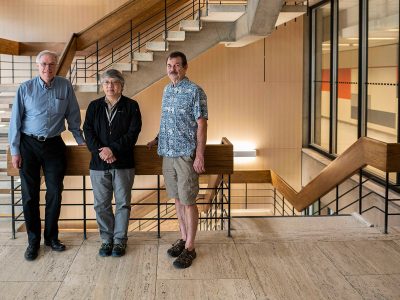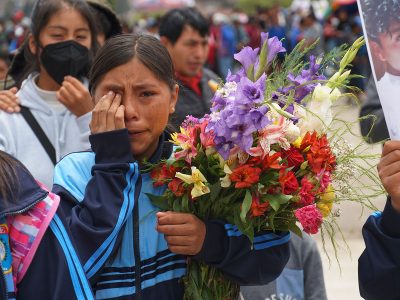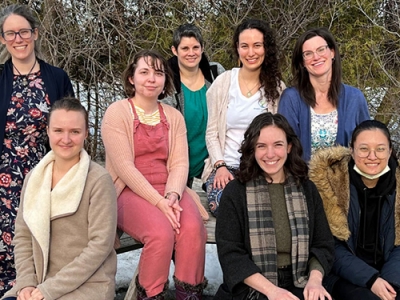All photos provided by Duncan McCue
By Catriona Koenig
Catriona Koenig is a fourth-year undergraduate student at Carleton University studying journalism and law. Her work has been published with The Globe and Mail and Cabin Radio. As someone who is trying to make native connections as a member of the Yellowknives Dene First Nation, she is excited to take McCue’s Reporting in Indigenous Communities course in the winter 2024 term.
Duncan McCue thinks all journalism students should know they can cover Indigenous issues in their very own backyards, and they should. McCue joined Carleton University’s School of Journalism and Communication as an Associate Professor this summer, and he will be leading a unique course in January 2024 called Reporting in Indigenous Communities (RIIC).
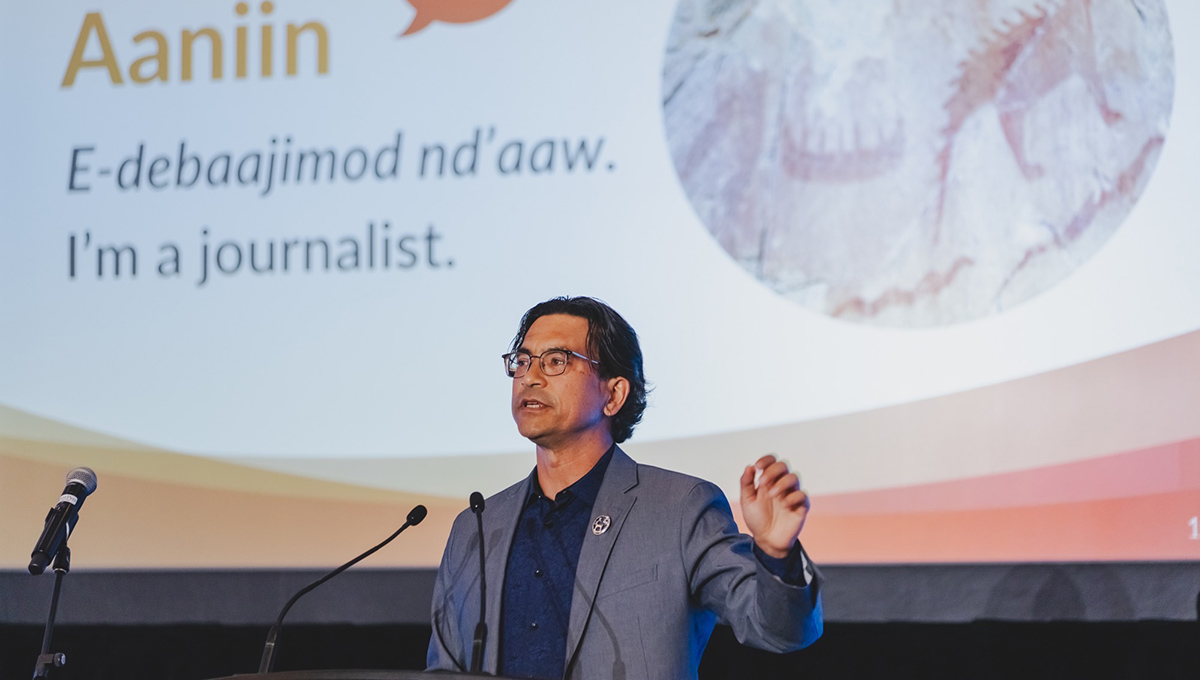
Duncan McCue addresses the Native American Journalists Association (now known as Indigenous Journalists Association) in August 2023. (Nadya Kwandibens)
“Wherever you are, there are going to be Indigenous peoples where you just need to reach out and start learning how to connect with,” he said.
McCue is an award-winning journalist with a passion for fostering and maintaining relationships between journalism and Indigenous communities. He has 25 years of experience at CBC News and 15 years of instructing at the UBC Graduate School of Journalism and Toronto Metropolitan University. McCue started teaching how to report in Indigenous communities years before the Truth and Reconciliation Commission of Canada released its entire 6-volume final report, and he’s been a frontrunner for developing curriculum on Indigenous issues in universities.
RIIC will follow a flipped classroom model. The key aspect of McCue’s course is to have students travel to local Indigenous communities and come back with a multimedia news story based on a central theme. In previous years at UBC, students have written stories about youth, sexuality, land, water, health and elders.
Carleton’s School of Journalism has community support with Pikwàkanagàn First Nation, an Algonquin First Nation on the shores of Golden Lake and the Bonnechere River in Renfrew County; Akwesasne, a Mohawk Nation territory that sits on both banks of the St. Lawrence River; Kitigan Zibi, an Algonquin First Nation that borders south-west on the Town of Maniwaki in the Outaouais region of Quebec; Urban Indigenous Ottawa, a group that encompasses all Indigenous peoples in urban areas of Ottawa and Gatineau; and Urban Inuit Ottawa, a group that includes all Inuit who reside in urban Ottawa.
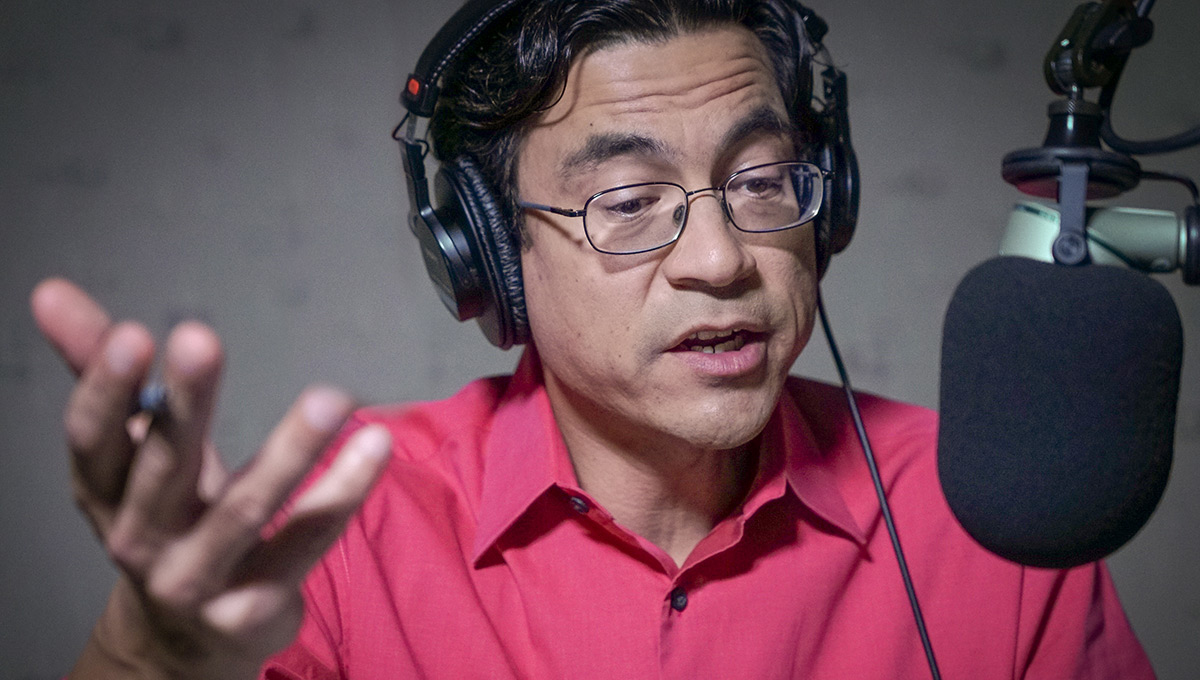
McCue was the host of CBC Radio’s Cross Country Checkup for four years. Cross Country Checkup is Canada’s only national open line radio program. (Sinisa Jolic/CBC)
McCue said the city hasn’t done a great job showing people in Ottawa about what it means to be on traditional, unceded territories of the Algonquin nation. “Indigenous peoples are often invisible in this place,” he said.
“It’s my hope that by taking this course, students will understand that there are Indigenous peoples side by side with them in their classrooms and in the buildings here on campus,” he said.
“There is a vibrant Indigenous community here in the City of Ottawa.”
In the first few classes, McCue plans to teach students about how journalists have neglected reporting on Indigenous peoples in the past, what it means when land is unceded, the history of Ottawa’s origin and why Indigenous peoples are asking for recognition of their historic rights. Then, once students are sent out in groups to travel to their partnered community, McCue will coach them through experiences that they are having out in the field.
“Whether it’s an Indigenous or non-Indigenous student, they meet people out there that are better teachers than I could ever be when teaching about Indigenous issues and how to report in Indigenous communities,” he said.
These relationships between students and communities are meant to be strong, long term commitments. “There have been too many journalists that go in and only care about the story that they’re working on and burn bridges. That impacts all the journalists that follow them afterwards because the doors start closing,” McCue said. “It’s really important for our students to understand that they need to be transparent and accountable when they’re working with these local communities.”
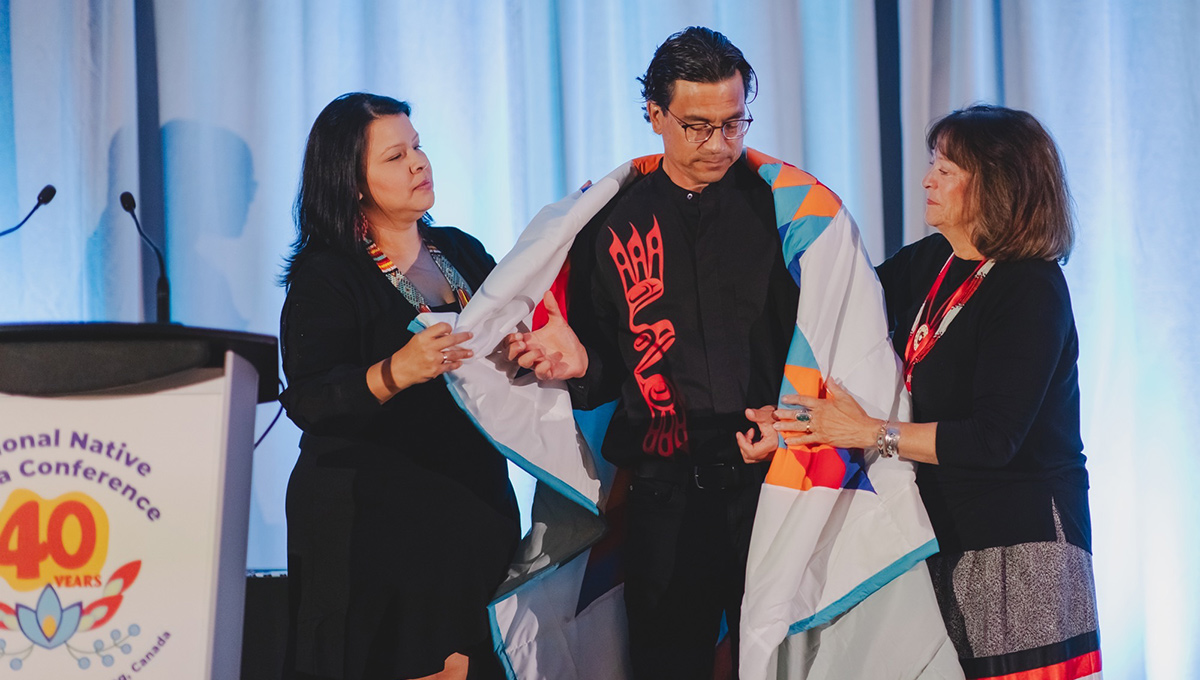
McCue receives a star blanket in recognition of his honouring as the 2023 NAJA Medill Milestone Award. This award acknowledges someone who has made an impact on the media and fosters responsible Indigenous storytelling and journalism. (Nadya Kwandibens)
One of McCue’s goals for the course is for students to graduate from RIIC understanding that the principle of reciprocity is fundamental to the practice of ethical journalism within an Indigenous context. To continue to foster these partnerships, McCue will teach students how to “give back” to communities. This may include, but is not limited to, students sharing their finished stories with the story subjects, sharing research where appropriate and volunteering in community-based programs.
“There’s only so much that I can share at the front of the classroom, or even in a textbook,” he said.
“I have always been of the opinion that the most powerful lessons that a student is going to learn is going to be out there in the community, which is why so much of the way I’ve designed the course is to push students outside the door.”
McCue is Anishinaabe, a member of the Chippewas of Georgina Island First Nation in southern Ontario.
Tuesday, September 26, 2023 in Community, Indigenous, Teaching and Learning
Share: Twitter, Facebook
